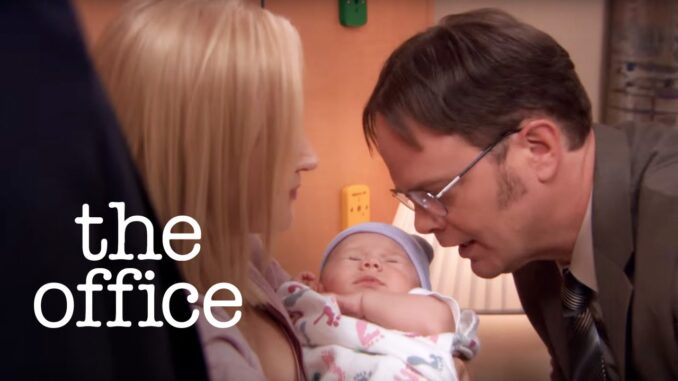
The fluorescent hum of Dunder Mifflin, the subtle clatter of keyboards, the ever-present drone of Michael Scott’s antics – for nine seasons, The Office unfolded as a meticulously crafted tapestry of American workplace life. Yet, beneath the layers of awkward silences and iconic catchphrases, the show was also a masterclass in subtle foreshadowing and delayed gratification. While many plot points blossomed conspicuously, one particular revelation, lurking in plain sight, proved to be a narrative landmine that most viewers stepped right over: the true paternity of Angela Martin’s son, Philip. The shock wasn’t that Philip was Dwight Schrute’s son; the shock was that the show had been telling us all along, and we collectively missed it.
From the moment Angela announced her pregnancy with Senator Robert Lipton, the prevailing assumption, reinforced by Angela’s own calculated demeanor, was that Philip was indeed the Senator’s child. This belief was solidified by the infamous DNA test, a scene designed, it would seem, purely to misdirect. Dwight, desperate for an heir and convinced the child was his, snatches a diaper from Philip, rushes it to a lab, and receives the devastating news: he is not the father. The audience, much like Dwight, felt the sting of rejection and accepted the result. Herein lies the first, and most brilliant, layer of the missed shock.
The genius of The Office writers lay in their understanding of human nature and narrative economy. They presented the DNA test result as incontrovertible proof, knowing full well that viewers would latch onto it as the definitive answer. What we missed, however, was the precise, blink-and-you-miss-it detail that rendered the test utterly meaningless. Dwight, in his frantic, single-minded pursuit, didn’t just grab any diaper. He grabbed a diaper from a hospital nursery. The subtle, yet crucial, detail is that Philip Halsted was not the only baby named Philip in that nursery. Dwight, in his typical Schruteian efficiency combined with his emotional turmoil, simply grabbed the first diaper he could find that belonged to a "Baby Philip." The DNA tested was not necessarily our Philip’s, but that of another, unrelated infant sharing the same common name. This fleeting moment, easily dismissed as a mere comedic beat in Dwight’s frantic quest, was the show’s sly wink, the whisper that said, “Don’t believe everything you see.”
Beyond the pivotal DNA mishap, Angela’s character consistently offered breadcrumbs of suspicion. Angela Martin, a woman whose entire persona was built on propriety, control, and a deeply ingrained sense of traditionalism, would never willingly settle for less than what she perceived as the absolute best for her child – which, ironically, was always Dwight. Her relationship with the Senator was always transactional, cold, and riddled with her discomfort. She married him for status, for the public facade of a respectable life, but her heart, for all its frostiness, still beat for Dwight. Her reluctance to embrace the Senator, her perpetual dissatisfaction, her thinly veiled contempt for his lifestyle, all hinted at a deeper, unexpressed truth. A woman as shrewd and calculating as Angela would not risk her social standing for a man she didn't truly love, unless there was an even greater, more fundamental reason to maintain the charade: protecting her secret, and by extension, her child’s true lineage, from the chaos that Dwight often brought.
Moreover, Philip himself, as he grew from infant to toddler, exhibited subtle traits that, in retrospect, screamed "Dwight." His stoic, almost unsmiling demeanor, his remarkable calm amidst the Dunder Mifflin chaos, even his seemingly inherent lack of interest in frivolous things, mirrored the unflappable and highly practical Dwight. There’s a memorable scene where Philip is photographed on the Schrute beet farm, looking perfectly at home amidst the mud and the beets – a visual foreshadowing that, at the time, felt like a sweet moment of acceptance, but now resonates as a testament to his true roots. The visual gag was, in fact, an illustrative clue.
The final, undeniable confirmation arrives in the penultimate episode, “AARM.” After years of dance, denial, and deception, Angela, trapped under a truck, vulnerable and at her lowest, confesses to Dwight: "He's yours, Dwight." The moment is cathartic, a release of tension that had simmered for seasons. For many, it was a genuine shock, an "AHA!" moment that recontextualized everything they thought they knew. But for those who revisited the series with fresh eyes, armed with the knowledge of the reveal, the shock dissipated, replaced by a profound appreciation for the writers’ masterful long-game storytelling.
The fact that so many viewers missed this crucial detail, including seasoned fans, is a testament to The Office's brilliance. It’s a show that trusts its audience to connect the dots, even when it’s actively trying to mislead them. The paternity of Philip Halsted wasn’t a twist sprung from nowhere; it was a revelation meticulously woven into the fabric of the series, a quiet hum beneath the louder comedic beats. It serves as a reminder that the most profound shocks in storytelling aren’t always the ones that explode onto the screen, but often the ones that have been patiently waiting, in plain sight, for us to finally open our eyes and truly see.
